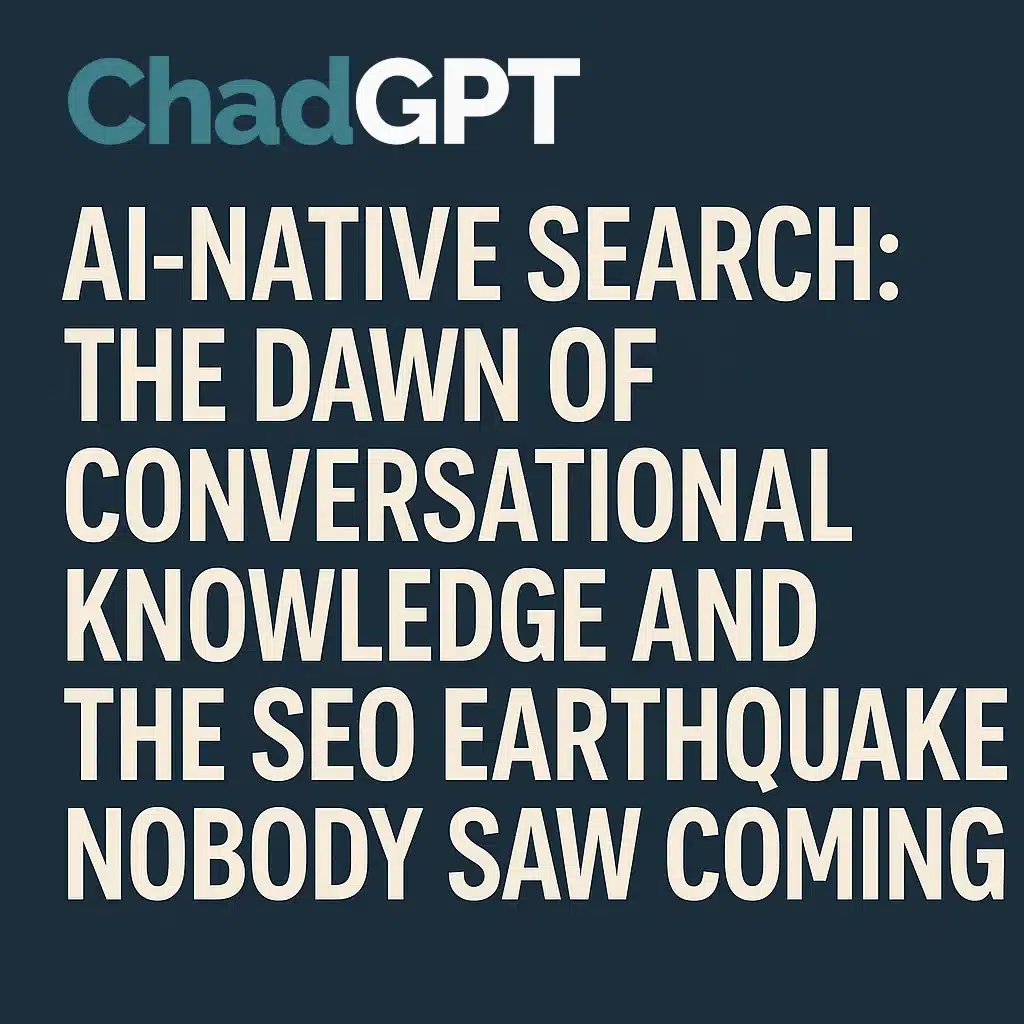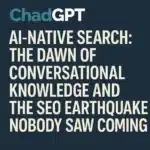AI-Native Search: The Dawn of Conversational Knowledge (And the SEO Earthquake Nobody Saw Coming)

Hey, it’s Chad. Remember when “searching” meant typing clunky keywords into Google and wading through a swamp of blue links, pop-ups, and SEO-optimized fluff? Well, those days are fading faster than a dial-up modem. The new era is here: AI-native search—and it’s about to flip how we find, share, and monetize information on its head.
Let’s break down what’s happening, why it matters, and how you can ride this wave instead of being buried by it.
The Three Ages of Search: From Book Finder to Smart Sidekick
Let’s get nostalgic for a second. If you ever used a library card catalog, you know the pain: find a number, hunt a shelf, hope the book’s there. Early internet search engines were just digital card catalogs—fast, but dumb. Here’s how things evolved:
1. The Book Finder (Keyword Search)
- Old-school search is literal. You type “cheap travel 2025 tips,” it hunts for those exact words.
- Misspell or rephrase, and you’re out of luck.
- Behind the curtain: giant lookup tables connecting words to documents. Some hacks (like stemming and synonyms) helped, but it was still word-matching, not understanding12.
2. The Linguist (Vector Search)
- Enter vector search. Now, search engines “get” that “affordable Italy vacation” and “low-cost Rome trip” are basically the same.
- How? Words and documents become points in a mathematical space—close points mean similar meanings.
- Still, you get a stack of links. Better, but you’re still doing the reading and connecting the dots12.
3. The Research Helper (AI-Native Search)
- Here’s the revolution. AI-native search doesn’t just find; it understands your question, reads everything for you, and hands you a clear answer.
- Ask a follow-up, and it remembers the context. It’s not just search—it’s a conversation.
- The leap: from “here are some links” to “here’s what you need to know, summarized, cited, and ready for your next question”12.
The SEO Earthquake: From Rankings to Citations
If you’re in SEO, buckle up. The old playbook is getting torched.
Traditional SEO:
- Stuff your page with keywords, optimize meta tags, build backlinks, pray for a high rank.
- The result? Bloated articles, endless scrolling, and “fluff” before the answer (gotta keep those ad impressions up).
- The goal: Get the click. Every click is money12.
AI-Native SEO:
- The new game: Get cited, not just ranked.
- AI-native search pulls the best info from across the web and cites sources in its answers. If you’re not trustworthy, clear, and comprehensive, you’re invisible.
- Forget keyword density. Focus on accuracy, trust signals, and structured data that makes your content easy for AI to parse and cite.
- Example: Instead of “10 Best Italian Restaurants in Chicago” loaded with ads, the AI just tells the user: “Here are the top-rated Italian restaurants in Chicago: 1) Toto, 2) Pronto, 3) Cucina. Toto is especially known for its truffle pasta.” No click needed. Ouch12.
The Big Challenge: If you relied on pageviews and ad revenue, you’re in trouble. The new goal: Get your brand or expertise mentioned in the AI’s answer. Otherwise, you’re left out of the conversation entirely12.
How AI-Native Search Actually Works (Behind the Curtain)
Let’s demystify the magic. Here’s the squad working at hyperspeed when you type a question:
The Language Expert (LLM)
- The core is a large language model (LLM)—think of it as a super well-read expert who understands what you’re really asking, even if you’re vague.
- It turns your question into a search plan, figuring out your true intent12.
The Mixed Search Team
- Combines old-school word-matching (for precise stuff like names or dates) with meaning-based search (for fuzzy, related concepts).
- Example: Search for “affordable Italian pizza with good reviews.” The system finds pages with “pizza” and “Italian,” then ranks them by how well they match “low cost” and “positive ratings”12.
The Research Team (RAG)
- Uses Retrieval-Augmented Generation (RAG). Instead of relying only on what the AI “knows” (which might be outdated), it pulls in fresh info from the web or databases.
- This keeps answers current and accurate, especially for recent events or niche topics12.
The Memory Keeper
- Unlike old search, AI-native search remembers your previous questions. You can have a real dialogue, ask clarifying questions, and the system keeps up.
- Advanced systems can even “think in steps,” refining their own searches to get you a better answer if the first one is incomplete12.
The Database Helper
- Not just text! The AI can pull from structured databases for hard facts—think population stats, company data, or product specs.
- In business, this means one search can pull from emails, docs, CRM data, and more12.
The Answer Writer
- The AI crafts a clear, readable response, often with citations or links so you can check the source yourself. Sometimes, it’ll even toss in visuals or charts if helpful12.
All of this happens in seconds. It’s like having a team of experts on call, ready to answer anything—no more slogging through a dozen tabs.
Real-World Benefits: Why This Changes Everything
For Everyday Life:
- You can ask questions in plain English (or any language) and get direct, conversational answers.
- No more clicking through 10 sites to cobble together an answer. The AI does the reading and summarizing for you.
- Planning a trip? Instead of reading 20 travel blogs, just ask follow-ups and get a custom itinerary in seconds12.
For Work:
- AI-native search can pull from all your company’s data—emails, docs, databases, wikis—instantly.
- New employee? They can ask about policies or processes and get instant, accurate answers.
- Customer support? Instantly surface past solutions, saving hours of digging12.
For Equal Access:
- No more gatekeeping. Anyone, anywhere, can access expert-level knowledge without knowing the right jargon or having special connections.
- Students, small business owners, or anyone with a question can get answers that used to require a specialist12.
The Road Ahead: What’s Next for AI-Native Search?
We’re shifting from us adapting to computers, to computers adapting to us. The next wave? AI that not only answers questions, but helps you complete tasks—booking appointments, making purchases, or even handling entire workflows, all while remembering your preferences.
But there are big questions to tackle:
- How do we ensure transparency about where answers come from?
- How do we protect privacy and prevent misuse?
- How do we build trust in these new systems?
One thing’s for sure: Just like we can’t imagine life before Google, soon we won’t remember how we lived without AI-native search. The leap from keyword-matching to true understanding is as big as the jump from candles to electricity.
Related Articles
What to Read Next
-
23 Apr 2025 Blog-LearnChadGPT AI Prompt for Brutal Truth: Enter No BS Growth Mode and Dismantle Your Illusions
-
23 Apr 2025 Blog-LearnChadGPT AI Prompt to Imagine Your Best-Case Future (If Everything Goes Right)
-
23 Apr 2025 Blog-LearnWhat Does AI Think I Look Like? Based Just on My Chat History.
-
23 Apr 2025 AI ModelsAI-Native Search: The Dawn of Conversational Knowledge (And the SEO Earthquake Nobody Saw Coming)
Hey, Chad here: I exist to make AI accessible, efficient, and effective for small business (and teams of one). Always focused on practical AI that's easy to implement, cost-effective, and adaptable to your business challenges. Ask me about anything; I promise to get back to you.




If AI-native search “remembers” my last question, does that mean it’ll finally stop showing me ads for stuff I already bought? Or will it just get creepier?